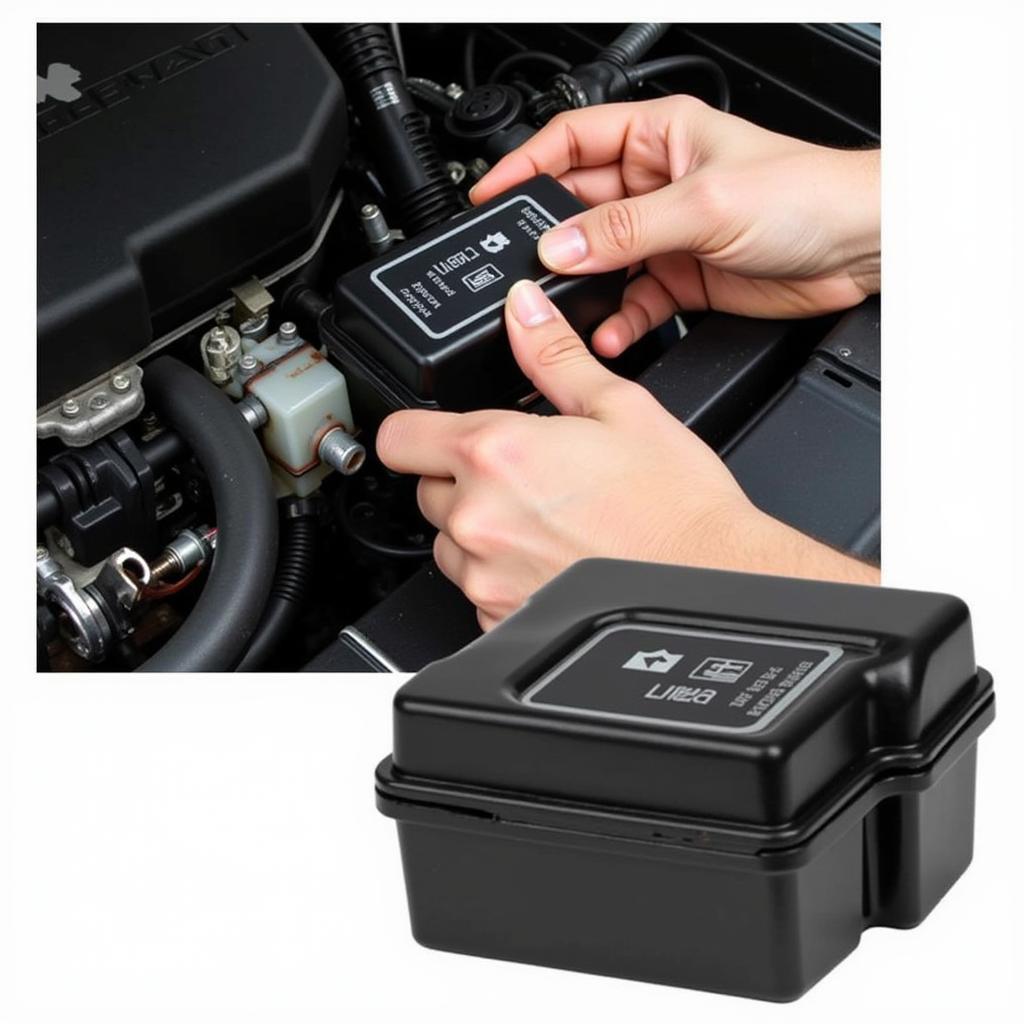If your Mitsubishi’s brake warning light stubbornly refuses to turn off, it’s a clear signal that something needs attention. This persistent glow can range from a simple fix to a more serious issue. This article will guide you through the common causes, troubleshooting steps, and solutions for a brake warning light that stays on in your Mitsubishi.
Understanding Your Mitsubishi’s Brake Warning Light
The brake warning light is a crucial safety feature designed to alert you to potential problems within your braking system. It’s important to understand that this light can indicate several different issues, not just low brake fluid. Ignoring this warning could lead to reduced braking performance and potentially dangerous driving situations.
One common misconception is that the brake warning light only relates to low brake fluid. While this is a frequent culprit, other factors, such as a faulty brake light switch, worn brake pads, or issues with the ABS system, can also trigger the light. Regular maintenance and timely diagnosis are crucial for ensuring the safety and reliability of your Mitsubishi’s braking system.
 Checking Mitsubishi Brake Fluid Level
Checking Mitsubishi Brake Fluid Level
Common Causes of a Persistent Brake Warning Light
Several factors can cause your Mitsubishi’s brake warning light to stay on. Here are some of the most common culprits:
- Low Brake Fluid: This is the most frequent reason. A leak in the brake lines or worn brake pads can cause the fluid level to drop, triggering the warning light. Check your brake fluid reservoir and top it off if necessary. If the fluid level drops again quickly, you likely have a leak that requires professional attention.
- Worn Brake Pads: Brake pads wear down over time. When they reach a certain point, a sensor triggers the warning light. Regular brake inspections are vital to catch worn pads before they cause further damage to the rotors.
- Faulty Brake Light Switch: This switch activates the brake lights when you press the brake pedal. A malfunctioning switch can also trigger the brake warning light. Testing the switch is relatively straightforward and can often be done with a multimeter.
- ABS Issues: Problems within the Anti-lock Braking System (ABS), such as a faulty sensor or module, can also illuminate the warning light. Diagnosing ABS issues typically requires specialized diagnostic tools.
- Parking Brake Engaged: Sometimes, the simplest solution is the most overlooked one. Make sure your parking brake is fully disengaged.
Troubleshooting the Brake Warning Light
Before rushing to a mechanic, you can perform some basic troubleshooting steps:
- Check the Parking Brake: Ensure the parking brake is completely released.
- Inspect Brake Fluid Level: Check the brake fluid reservoir. If it’s low, top it off with the correct type of brake fluid specified in your owner’s manual.
- Visually Inspect Brake Lines: Look for any signs of leaks or damage in the brake lines.
- Check Brake Pads: If you’re comfortable doing so, check the thickness of your brake pads.
When to Seek Professional Help
While some issues can be resolved with DIY troubleshooting, others require professional expertise. If you’ve checked the basics and the light remains on, it’s best to take your Mitsubishi to a qualified mechanic. Ignoring the warning light could lead to more serious and costly repairs down the road.
How Much Does it Cost to Fix a Brake Warning Light on a Mitsubishi?
The cost of fixing a brake warning light on a Mitsubishi can vary significantly depending on the underlying cause. A simple brake fluid top-up might only cost a few dollars, while replacing worn brake pads could range from $150 to $300 per axle. More complex repairs, such as fixing a faulty ABS module, can be significantly more expensive.
“Regular brake inspections are an investment in safety,” says John Miller, a seasoned automotive technician with over 20 years of experience. “Catching potential issues early can save you money and prevent dangerous situations on the road.”
Conclusion
A persistent brake warning light in your Mitsubishi should never be ignored. By understanding the potential causes and following the troubleshooting steps outlined in this article, you can take the necessary actions to ensure your safety and the proper functioning of your vehicle’s braking system. Remember, if you’re unsure about anything, consulting a qualified mechanic is always the best course of action. Addressing the issue promptly will not only keep you safe but also prevent further damage and potentially costly repairs. For those experiencing issues with their Toyota Hilux AdBlue system, check out the resources available for toyota hilux adblue warning and reset adblue hilux. These guides might provide valuable insights for those dealing with similar warning light issues.
FAQ
- What does the brake warning light mean? The brake warning light indicates a potential problem within your braking system, such as low brake fluid, worn brake pads, or issues with the ABS.
- Can I drive with the brake warning light on? It’s not recommended. Driving with the brake warning light on can be dangerous, as it indicates a potential problem with your braking system.
- How do I check my brake fluid level? Locate the brake fluid reservoir under the hood and check the fluid level against the minimum and maximum markings.
- How often should I check my brake pads? It’s recommended to visually inspect your brake pads every few months, or more frequently if you drive in harsh conditions.
- What should I do if my brake warning light stays on after adding brake fluid? If the light stays on after topping off the brake fluid, you should take your Mitsubishi to a mechanic for further diagnosis.
- How can I reset my brake warning light? The brake warning light will typically reset itself once the underlying issue is resolved.
- What is the ABS system? The Anti-lock Braking System (ABS) helps prevent wheel lockup during hard braking, improving vehicle control and stability.
